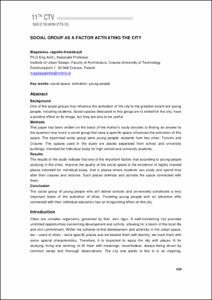Mostra el registre d'ítem simple
Social group as a factor activating the city
| dc.contributor.author | Jagiełło-Kowalczyk, Magdalena |
| dc.date.accessioned | 2016-10-04T14:47:19Z |
| dc.date.available | 2016-10-04T14:47:19Z |
| dc.date.issued | 2016-07 |
| dc.identifier.citation | Jagiełło-Kowalczyk, Magdalena. Social group as a factor activating the city. A: Virtual City and Territory. "Back to the Sense of the City: International Monograph Book". Barcelona: Centre de Política de Sòl i Valoracions, 2016, p. 439-451. |
| dc.identifier.isbn | 978-84-8157-660-3 |
| dc.identifier.uri | http://hdl.handle.net/2117/90493 |
| dc.description.abstract | Background: One of the social groups that influence the activation of the city to the greatest extent are young people, including students. Social spaces dedicated to this group are to embellish the city, have a positive effect on its image, but they are also to be useful. Methods: This paper has been written on the basis of the Author’s study devoted to finding an answer to the question how much a social group that uses a specific space influences the activation of this space. The examined social group were young people, students from two cities: Toronto and Cracow. The spaces used in the study are places separated from school and university buildings, intended for individual study for high school and university students. Results: The results of the study indicate that one of the important factors that according to young people studying in the cities improve the quality of the social space is the existence of legibly marked places intended for individual study, that is places where students can study and spend time after their classes and lectures. Such places animate and activate the space connected with them. Conclusion: The social group of young people who still attend schools and universities constitutes a very important factor of the activation of cities. Providing young people with an attractive offer connected with their individual education has an invigorating effect on the city. |
| dc.format.extent | 13 p. |
| dc.language.iso | eng |
| dc.publisher | Centre de Política de Sòl i Valoracions |
| dc.relation.ispartof | International Conference Virtual City and Territory (11è: 2016: Cracòvia) |
| dc.rights | Attribution-NonCommercial-NoDerivs 3.0 Spain |
| dc.rights.uri | http://creativecommons.org/licenses/by-nc-nd/3.0/es/ |
| dc.subject | Àrees temàtiques de la UPC::Urbanisme |
| dc.subject | Àrees temàtiques de la UPC::Arquitectura::Tipologies d'edificis |
| dc.subject.lcsh | Cultural facilities -- Canada -- Toronto |
| dc.subject.lcsh | Cultural facilities -- Poland -- Kraków |
| dc.subject.lcsh | Youth |
| dc.subject.other | Social space |
| dc.subject.other | Activation |
| dc.subject.other | Young people |
| dc.title | Social group as a factor activating the city |
| dc.type | Conference report |
| dc.subject.lemac | Equipaments col·lectius -- Canadà -- Toronto |
| dc.subject.lemac | Equipaments col·lectius -- Polònia -- Cracòvia |
| dc.subject.lemac | Joves |
| dc.identifier.doi | 10.5821/ctv.8069 |
| dc.rights.access | Open Access |
| local.citation.contributor | Virtual City and Territory |
| local.citation.pubplace | Barcelona |
| local.citation.publicationName | Back to the Sense of the City: International Monograph Book |
| local.citation.startingPage | 439 |
| local.citation.endingPage | 451 |
Fitxers d'aquest items
Aquest ítem apareix a les col·leccions següents
-
11th Congress Virtual City and Territory, Krakow, 6-8 July 2016 [121]
Back to the sense of the city


